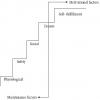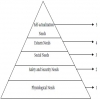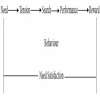Home | ARTS | Management Concepts & Organisational Behaviour
|
David Mc Clelland’s Three Need Model - Motivation
Management Concepts & Organisational Behaviour - Motivation
David Mc Clelland’s Three Need Model - Motivation
Posted On :
David McClelland gave a model of motivation which is based on three types of needs achievement, power and affiliation. They are stated below:
David Mc
Clelland’s Three Need Model
David McClelland gave a model of motivation which is based on three types of needs achievement, power and affiliation. They are stated below:
1. Need for achievement (n Ach): a drive to excel, advance and grow
2. Need for power (n Pow): a drive to influence others and situations
3. Need for affiliation (n Aff): a drive for friendly and close interpersonal relationships.
Some people have a compelling drive to succeed and they strive for personal achievement rather than the rewards of success. This drive is called the need for achievement (n ach). Based on his extensive research into the achievement need, McClelland found that high achievers differentiate themselves from others by their desire to do things better. They seek situations where they can attain personal responsibility for finding solutions to problems, where they can receive rapid feedback on their performance so they can set moderately challenging goals. High achievers are not gamblers; they dislike succeeding by chance. They prefer the challenge of working at a problem and accepting the personal responsibility for success or failure, rather than leaving the outcome to chance or the actions of others.
The need for power (n pow) is a drive to have impact, to be influential and to control others. Individuals high in n pow enjoy being “in charge”, strive for influence over others, prefer to be placed into competitive and status oriented situations, and tend to be more concerned with gaining influence over others than with effective performance. Power-motivated people wish to create an impact on their organisations and are willing to take risks to do so.
This need has received the least attention of the researchers. Affiliation need (nAff) can be viewed as the desire to be liked and accepted by others. It is the drive to relate to people on a social basis. Individuals with a high affiliation motive strive for friendship, prefer cooperative situations rather than competitive ones, and desire relationship involving a high degree of mutual understanding.
People possess the above needs in varying degrees. However, one of the three needs will tend to be more characteristic of the individual. Individuals with a high need for achievement thrive on jobs and projects that tax their skills and abilities. Such individuals are goal-oriented in their activities, seek challenge and want task relevant feedback. Individuals with high power seek to dominate, influence or have control over others. McClelland’s research revealed that managers generally score high on the need for achievement. In other words, motivating forces for managers lie in the challenge and potential of the job.
David McClelland gave a model of motivation which is based on three types of needs achievement, power and affiliation. They are stated below:
1. Need for achievement (n Ach): a drive to excel, advance and grow
2. Need for power (n Pow): a drive to influence others and situations
3. Need for affiliation (n Aff): a drive for friendly and close interpersonal relationships.
Achievement Motivation
Some people have a compelling drive to succeed and they strive for personal achievement rather than the rewards of success. This drive is called the need for achievement (n ach). Based on his extensive research into the achievement need, McClelland found that high achievers differentiate themselves from others by their desire to do things better. They seek situations where they can attain personal responsibility for finding solutions to problems, where they can receive rapid feedback on their performance so they can set moderately challenging goals. High achievers are not gamblers; they dislike succeeding by chance. They prefer the challenge of working at a problem and accepting the personal responsibility for success or failure, rather than leaving the outcome to chance or the actions of others.
Power Motivation
The need for power (n pow) is a drive to have impact, to be influential and to control others. Individuals high in n pow enjoy being “in charge”, strive for influence over others, prefer to be placed into competitive and status oriented situations, and tend to be more concerned with gaining influence over others than with effective performance. Power-motivated people wish to create an impact on their organisations and are willing to take risks to do so.
Affiliation Motivation
This need has received the least attention of the researchers. Affiliation need (nAff) can be viewed as the desire to be liked and accepted by others. It is the drive to relate to people on a social basis. Individuals with a high affiliation motive strive for friendship, prefer cooperative situations rather than competitive ones, and desire relationship involving a high degree of mutual understanding.
People possess the above needs in varying degrees. However, one of the three needs will tend to be more characteristic of the individual. Individuals with a high need for achievement thrive on jobs and projects that tax their skills and abilities. Such individuals are goal-oriented in their activities, seek challenge and want task relevant feedback. Individuals with high power seek to dominate, influence or have control over others. McClelland’s research revealed that managers generally score high on the need for achievement. In other words, motivating forces for managers lie in the challenge and potential of the job.
Tags : Management Concepts & Organisational Behaviour - Motivation
Last 30 days 1138 views















